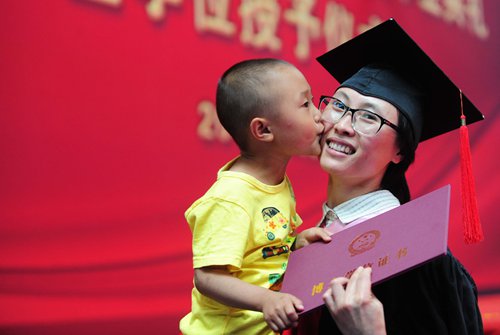
A mother takes her child to attend her PhD graduation ceremony at Shenyang Agricultural University on June 28, 2015. (Photo: VCG)
"My family has been giving me support and never pushed me to have a baby, but I can sense their fondness for babies from how they adore the babies of the neighbors," Yang said.
The university Yang is studying at for her doctorate is a top university in northwestern China with strict graduation requirements, which is another source of stress Yang is facing.
Yang's dilemma coincides with a hot debate on zhihu.com, a Quora-like platform in China, on whether female doctoral students should have babies during their PhD studies, since the optimum childbearing age span for Chinese females is from 25 t0 30, which overlaps with the age of most doctoral students.
Hindered studies
Zhang Haixia, a professor with Peking University, holds no brief for female doctoral students having children without an agreement with the graduate advisor ahead of time.
"Doctoral admission is a reciprocal commitment, in which students seek the right advisors to do research with to attain self-improvement and pursue doctoral degrees, and advisors have research tasks to finish together with students," Zhang wrote in an article posted on her blog on ScienceNet.cn, a science virtual community.
A doctoral student from a university in Wuhan, Central China's Hubei Province advises women not to have babies during the study period, commenting on the same topic in Zhihu, "Please keep it in mind that a laboratory is your home, a dissertation is your baby, and it is not something in your head, it is the truth. The heavy task of publishing papers in key journals will not allow the slightest distraction."
Zhang said that a professor's research could be hindered if a student spends one or two years taking care of an infant during her three to five years of doctoral studies, but it is understandable if an agreement is reached with the advisor in advance.
Babies are more important
Ma Jun, a professor at Lanzhou University of Technology, thought differently, writing in his blog that life is not only about scientific research. Ma called on advisors to be a life mentor. "It's a pity for people to miss a baby in the best time of their life," said Ma.
Worrying about juggling studies and raising a child can be worse than actually making a decision.
"Psychological barriers are the biggest impediments to having a baby during PhD studies," 27-year-old Guo Fan (pseudonym) told the Global Times.
"It is important to anticipate all the possible difficulties and confront them with bravery."
Guo gave birth to her son in the last year of her PhD study when she was 25 years old. "Of course a baby is more important," Guo said of her decision between a baby and a doctoral degree.
But Guo admitted that nursing the baby hindered her PhD studies. "I had to stay up late to write my dissertation," said Guo. In the end, all the extra effort paid off, because she was awarded her PhD degree as scheduled.
"Nursing a baby during doctoral studies looks glamorous on the surface, but only the insider knows what a bother it is," Guo said.
Zhou Jun believes a proper timetable, family support and an advisor's understanding are important to what she has achieved today.
Zhou, who gave birth to her second baby in her second year of doctoral studies at the age of 36, told the Global Times that her studies were not influenced at all thanks to the help from her parents and in-laws. She is scheduled to be awarded her PhD degree next year from Xi'an Jiaotong University.
Vocational leave
Career advancement is another consideration for those who choose to have babies during their doctoral studies. Yang said the reason she is considering a baby now is that she is afraid her career might be affected if she takes maternal leave in the first several years after she graduates.
Luo Ruixue, a member of the women's rights group Women Awakening Network, believes that having a baby and academic research are both important, and no matter which decision a woman makes is right.
Luo also called for fathers to play a role. "Fathers should also be entitled to childcare leave to diminish women's concerns about nursing interfering with academic research.
"Society and government should support parents more in terms of culture and institutions, giving them more space to make choices freely," Luo told the Global Times.


